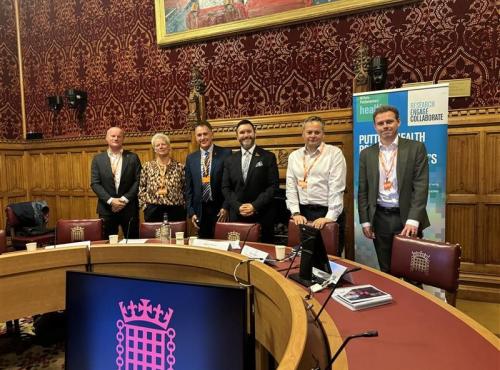Covid-19 Vaccination: Development, Distribution and Breaking Down Barriers
The development and roll out of the Covid-19 vaccination programme represents the greatest feat of innovation, speed and collaboration ever seen in healthcare. A five-to-ten-year research and development process was shortened to under a year and over 70 million people received at least one dose of safe and effective vaccines in just a 6-month period. The pace of work and dedication of all involved in developing and delivering the vaccination programme has surpassed all expectations.
On Thursday 10th June, Baroness Finlay hosted an All-Party Parliamentary Health Group roundtable examining both the successes of the UK’s Covid-19 vaccination role out and the barriers still to overcome in ensuring equity in access and uptake for all.
Speakers included:
- Nadhim Zahawi MP, Vaccines Minister
- Ben Osborn, Managing Director of Pfizer
- Dr Sarah Tade, GP and NHS Clinical Entrepreneur
- Dr Shehla Imtiaz-Umer, GP and member of the British Islamic Medical Association.
They were joined by a wide range of stakeholders including community advocacy groups, academics, life sciences industry figures, clinicians and wider health care professionals.
Understanding vaccine hesitancy
Despite the success of the Covid-19 vaccination programme, government Ministers, industry and health care professionals recognise that there is still much to do. Vaccine positivity in the UK is one of the highest in the world but this does not mean the UK can afford to be complacent. Vaccine hesitancy often overlaps with communities most at risk of Covid-19, particularly those in ethnic minority groups with pre-existing health conditions and multiple barriers to vaccination.
“These people [those who are vaccine hesitant] are not necessarily hard to reach, but they are hard to influence.” - Dr Sarah Tade
The reasons for this hesitancy are manifold and complex, from social determinants including housing and employment to misinformation tailored to individual groups. Attendees highlighted this issue and raised concerns about incorrect health information delivered via social media and WhatsApp. Others raised the persistent challenge of a lack of trust and suspicion of a health service that is perceived to be disengaged with communities’ problems and not concerned about other forms of health inequality.
Collective action
“There is work to do in African and Afro Caribbean community with hesitancy, sometimes we need to have conversations and answer questions. Some hesitancy is historic and some cultural. Some people have suspicion of the pharma ecosystem which we need to continue to address.” - Nadhim Zahawi MP, Vaccines Minister
Many trusted local leaders, health service and religious workers have collaborated with the Government, industry, and communities to reduce vaccine hesitancy and increase uptake. Speakers highlighted the importance of vaccinations delivered locally, in a trusted place from a trusted person. Another key factor is the need to dispel vaccine misinformation and carry out myth-busting exercises to reassure communities. Information provided must be language accessible, culturally appropriate and take into account specific time and place concerns, such as concerns regarding vaccination during Ramadan.
“Planning at a hyperlocal level and working bottom up has been effective… We have been able to modify GP contracts to create pop up centres in religious centres.” - Nadhim Zahawi MP, Vaccines Minister
The government has acknowledged these challenges and invested £24 million across 60 local authorities to promote local initiatives and create community champions. There have been trials across intergenerational households to increase uptake among younger generations and influence the behaviour of their older relatives. Speakers discussed their own work, for example producing clear information in a variety of languages, delivered through religious centres. Gilead Sciences discussed the transferrability of their work Hepatitis C testing among Muslim communities through the use of comedians and other famous trusted figures to encourage uptake and conversations between generations.
However, hesitancy must be consistently challenged to ensure that second doses of the vaccine and subsequent booster doses, that could be the future of living with the virus, are reliably taken up. Furthermore, the emergence of the Delta variant threatens to disproportionately affect vaccine-hesitant communities.
Health inequalities – the challenge and opportunity
To increase vaccine positivity and uptake over the long term, we must address long-standing health inequalities that have contributed to a lack of trust. There are outstanding health inequalities affecting vaccine-hesitant groups, from higher maternal mortality in black and South Asian women, to the rates of black men detained under the Mental Health Act, to increased cancer rates among those in lower socioeconomic groups. Black people are reportedly twice as likely to die from Covid-19 as white people, shining a spotlight on health and social inequality in a way that has rarely been highlighted before.
“This momentum, motivation and drive must continue in order to address other health inequalities” - Dr Shehla Imtiaz-Umer
If the lessons from the Covid-19 vaccination programme, and the pandemic more broadly, are to be learnt, there must be long-term investment in reducing the widely-known inequalities affecting health outcomes.
“We cannot waste this progress, there are many learnings and now is the time to use the health of the nation as an asset that we invest in, nurture and shape policy accordingly.” - Ben Osborn
Reducing health inequality will: help the UK keep Covid-19 infection levels low, increase healthy life expectancy, help rebuild the economy and reduce health spending. The benefits span across the life course of individuals, communities, and society as a whole. The progress made in building trust and creating equitable access to the vaccine must not be wasted; instead, it should be the springboard required to maintain engagement and address inequality across the health and social care system.




